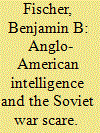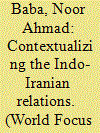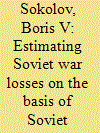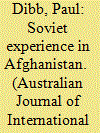| Srl | Item |
| 1 |
ID:
111183


|
|
|
|
|
| Publication |
2012.
|
| Summary/Abstract |
During the Soviet war scare of the 1980s, British intelligence shared vital information from KGB officer Oleg Gordievsky with its American partners. The US intelligence community, however, was suspicious of the message and the messenger, dismissing Soviet 'war talk' as disinformation. Some officials even believed that the British had tweaked their reports to influence US policy. President Ronald Reagan, however, on the advice of Prime Minister Margaret Thatcher, listened to Gordievsky rather than his intelligence advisors. The war scare had a profound influence on Reagan's thinking about nuclear war, Kremlin fears, and Soviet-American relations that led him to seek a new détente with Moscow and the end of the Cold War through diplomacy rather than confrontation. Subsequent events and post-Cold War revelations vindicated Gordievsky. Reagan sought his advice on the eve of his first summit meeting with Mikhail Gorbachev and later expressed his gratitude during a private meeting in the Oval Office.
|
|
|
|
|
|
|
|
|
|
|
|
|
|
|
|
| 2 |
ID:
121060


|
|
|
|
|
| Publication |
2013.
|
| Summary/Abstract |
The Islamic revolution in Iran during 1978-79 resulted in bringing about a fundamental change in the Iranian foreign policy orientation that had a positive bearing on the indo-Iranian relationship. To reinforce this relationship the two countries began to discover and emphasize a number of commonalities between the two in history and in contemporary times. In this context while as Pakistan continued to be pro-west and the US partner in anti-Soviet war in Afghanistan, Iran gained greater proximity with India as a member of non- aligned community. In the changed context Iran became weary of the OIC and its activities. This indifference towards OIC and many of its conservatively oriented concerns was reinforced by Iraq-Iran war that polarized the Muslim countries.
|
|
|
|
|
|
|
|
|
|
|
|
|
|
|
|
| 3 |
ID:
133763


|
|
|
|
|
| Publication |
2014.
|
| Summary/Abstract |
The problem of calculating the Soviet losses in the Second World War has confronted scholars with potentially insoluble difficulties. Especially in the first year of the war, during the catastrophic defeats and disorganized retreats, individual records on Soviet military personnel were either simply not kept or were lost or destroyed. Even during the war, the Soviet government criticized the failure to keep casualty lists up to date and noted that often soldiers were killed or went missing even before they were formally added to the unit rosters. The Red Army had no equivalent to the dog tag. Many soldiers, out of superstition, refused to wear the smertniki-little wooden cases that held identification information on slips of paper-believing that a wearer was ordained to die. Official estimates to this date, however, appear plainly understated. The author proposes a new method for estimating the Soviet personnel losses in the Second World War, based on the 1939 and 1956 censuses of the Soviet population.
|
|
|
|
|
|
|
|
|
|
|
|
|
|
|
|
| 4 |
ID:
024265


|
|
|
|
|
| Publication |
New York, Praeger, 1989.
|
| Description |
x, 249p.Hbk
|
| Standard Number |
0-275-93051-3
|
|
|
|
|
|
|
|
|
|
|
|
Copies: C:1/I:0,R:0,Q:0
Circulation
| Accession# | Call# | Current Location | Status | Policy | Location |
| 032346 | 940.5488673/SOL 032346 | Main | On Shelf | General | |
|
|
|
|
| 5 |
ID:
099442


|
|
|
|
|
| Publication |
2010.
|
| Summary/Abstract |
This article examines the experience of the Soviet army's occupation of Afghanistan from 1979 to 1989. It draws heavily on the report of the Russian General Staff, which gives a unique insight into the Soviet-Afghan war by senior Russian officers, many of whom served in Afghanistan. The author then places this analysis in the broader geopolitical context of Soviet expansionism from the early 1970s to the mid 1980s. And the author proceeds to ask: Did Afghanistan account for the demise of the USSR? Finally, the issue of whether there are parallels with the failure of the Soviet Union's invasion and the current problems facing the USA in Afghanistan is examined.
|
|
|
|
|
|
|
|
|
|
|
|
|
|
|
|